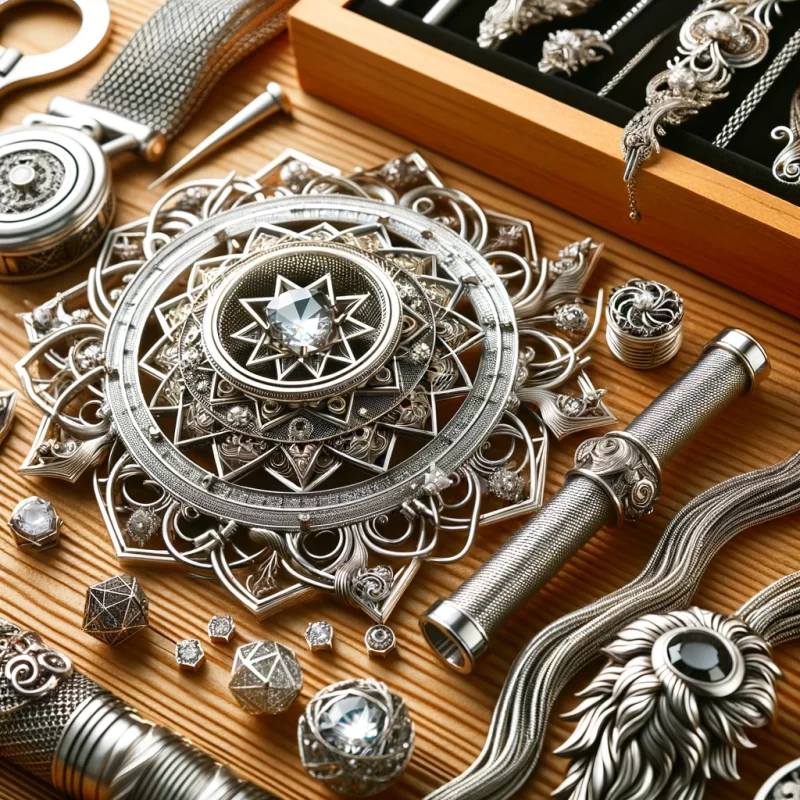Have you ever wondered why Damascus steel seems to have a mystical allure in jewelry shops, but the price tag is surprisingly not as astronomical as you’d expect? While the wavy, woodgrain-like patterns of Damascus steel scream luxury, the price doesn’t always reflect that high-end look. That’s what makes this metal such a sweet spot for modern jewelers and customers alike. But how does it truly measure up to the likes of gold, titanium, and stainless steel?
Let’s break it down and see where Damascus steel shines in terms of pricing, value, and quality.
Why is Damascus Steel So Unique?
Damascus steel is famous for its distinctive layered patterns. These patterns are the result of welding together different types of steel, which gives it that rich, rippled texture, much like flowing water. Historically, Damascus steel was used to make swords that were both strong and flexible, so it’s got a strong foundation of durability.
Today, it’s mostly used in high-end wedding bands, rings, necklaces, and even watches. But here’s the kicker: no two Damascus steel pieces are the same! Each one is like a fingerprint, which gives it massive appeal to people looking for something unique. For businesses, this uniqueness can be a huge selling point, as consumers increasingly look for personalized and distinct jewelry options.
Answer: Damascus steel offers uniqueness and high-end aesthetics at a surprisingly affordable price compared to metals like gold.
Damascus Steel vs. Gold: Which Packs More Value?
Gold is the OG of high-value jewelry. It’s shiny, timeless, and let’s face it—owning gold is a status symbol. However, with that status comes high maintenance. Gold can get scratched easily, it’s soft, and if you wear it daily, you’ll probably need to polish it regularly. On the other hand, Damascus steel is extremely durable, and it’s much more resistant to everyday wear and tear.
Here’s the pricing twist: while gold is priced based on weight and market value (which fluctuates), Damascus steel is far more stable in terms of cost. The price isn’t dictated by stock markets, and since it’s a mixture of different steels, it’s relatively cheaper. But this doesn’t mean you sacrifice quality—it’s got the looks of a luxury metal without the luxury price tag.
So, in terms of value for money, Damascus steel beats gold when it comes to durability and low maintenance.
How Does Damascus Steel Compare to Titanium?
Titanium has built a reputation as the go-to metal for lightweight, hypoallergenic, and strong jewelry. It’s favored for wedding bands because it’s scratch-resistant and can last a lifetime with minimal maintenance. However, titanium can’t beat Damascus steel in one key area: aesthetics.
Damascus steel has patterns that titanium simply can’t replicate. While titanium is sleek and modern, it’s also quite plain. If you’re looking for a piece of jewelry that makes a statement, Damascus steel is the clear winner. And here’s another fun fact—Damascus steel rings are typically just as hypoallergenic as titanium ones, making them suitable for those with sensitive skin.
Price-wise, titanium and Damascus steel are often in the same ballpark. But Damascus steel’s visual appeal and uniqueness give it a slight edge in perceived value, even if you pay about the same price.
Stainless Steel vs. Damascus Steel: Is There Really a Comparison?
Stainless steel is probably the most common metal used in mass-produced jewelry. It’s affordable, durable, and easy to maintain, making it the go-to for budget-conscious buyers. But here’s the thing—stainless steel lacks the premium appeal that Damascus steel brings to the table. The layered textures and hand-forged look of Damascus steel make it feel more luxurious, even though they’re quite close in pricing.
For businesses targeting customers who are willing to spend just a little more for something special, Damascus steel offers a way to upsell without moving into expensive territory like gold or platinum. The extra bit of craftsmanship and design in Damascus steel makes it a premium option at a mid-tier price.
Damascus Steel and Platinum: How Do They Compare?
Platinum is known for being the king of metals when it comes to price. It’s dense, luxurious, and extremely durable, but with all that prestige comes a hefty price tag. Platinum jewelry can cost thousands of dollars, and it’s often reserved for those looking to splurge.
In contrast, Damascus steel offers a similar level of durability, especially when it comes to scratch resistance, but at a fraction of the cost. It also offers more visual interest with its layered designs, something platinum simply can’t provide. For buyers who want to feel unique and not just part of the “platinum club,” Damascus steel becomes an attractive alternative that won’t break the bank.
So, What’s the Verdict on Pricing and Value?
Here’s the bottom line: Damascus steel offers a blend of uniqueness, durability, and affordability that’s hard to beat. While it can’t claim the prestige of gold or platinum, it provides a stunning alternative for consumers looking for something distinctive without the high cost. Whether you’re comparing it to gold’s shine, titanium’s toughness, or stainless steel’s simplicity, Damascus steel brings a luxury look at a mid-range price.
For businesses, this means you can offer your customers high-end aesthetics without pricing them out of the market. And with its increasing popularity, Damascus steel jewelry is becoming a smart investment in both style and substance.
The Role of Craftsmanship in Damascus Steel Pricing
One critical factor that can greatly influence the price of Damascus steel jewelry is the level of craftsmanship involved. Unlike most mass-produced metals like stainless steel, Damascus steel is crafted using ancient techniques. The art of layering and welding different types of metal together creates not only its signature wave-like patterns but also a unique, hand-forged feel.
For retailers, this can be a significant selling point. When your customer asks, “What makes this ring more special than a simple stainless steel one?” the answer is clear: craftsmanship. Each piece is a labor of love, combining artistry with durability. And while this added craftsmanship might slightly bump the price, it adds value far beyond the cost.
When compared to other metals, the intricate craftsmanship of Damascus steel creates a higher perceived value, making it a smart choice for mid-range luxury without pushing into the sky-high prices of platinum or gold.
Long-Term Value: How Does Damascus Steel Hold Up Over Time?
One of the key factors consumers consider when purchasing jewelry is how well the material holds up over time. Here, Damascus steel has some strong advantages, especially compared to metals like gold and platinum. Both gold and platinum can be susceptible to scratching, bending, or losing their shine over time. In contrast, Damascus steel is known for its durability and scratch resistance.
This durability gives it a leg up over other metals for people who wear their jewelry daily. Whether it’s a wedding band that faces daily wear or a statement piece worn to special events, Damascus steel holds its integrity without requiring constant polishing or repairs.
From a business perspective, offering Damascus steel jewelry allows you to present a high-value, low-maintenance option. Customers love jewelry that lasts without needing constant care, and with Damascus steel, you’re delivering just that.
How Damascus Steel’s Production Process Affects Its Price
When it comes to pricing, production methods play a significant role. Damascus steel is created through a labor-intensive process that involves layering different types of steel together, folding, twisting, and forging the metal. This process requires both skill and time, which naturally impacts the final cost of the product.
However, unlike metals such as platinum or gold, where material cost is a significant driver of the price, the pricing for Damascus steel is more focused on the effort and craftsmanship that goes into each piece. Because the materials used in Damascus steel are often relatively affordable (such as carbon steels and stainless steels), you get a premium look and feel without the premium price associated with metals like platinum.
For businesses, this means you can offer your customers a product that looks and feels expensive without the hefty price tag, making it easier to cater to both high-end and budget-conscious clients.
Environmental Impact and Sustainability of Damascus Steel
As sustainability becomes an increasingly important issue for consumers, the environmental impact of the materials used in jewelry has started to factor into purchasing decisions. In this context, Damascus steel fares quite well compared to some other metals.
The production of gold and platinum often involves environmentally harmful mining practices that leave large carbon footprints. Damascus steel, on the other hand, is created by recycling steel through forging. This not only reduces waste but also gives jewelers and consumers a more environmentally friendly option.
The fact that Damascus steel is made from recycled materials can serve as a great eco-conscious selling point for retailers looking to attract environmentally minded customers. You get a beautiful, durable product while keeping the environmental impact low—a win-win for you and the planet!
Trends: Why Damascus Steel is Gaining Popularity in Jewelry Stores
In recent years, Damascus steel jewelry has been trending up, especially in men’s wedding bands and statement rings. But why is this metal suddenly so popular?
- Unique Aesthetics: As mentioned earlier, no two Damascus steel pieces are alike, which is a huge draw for customers looking for something unique. Modern buyers love the idea of owning something truly one-of-a-kind.
- Durability and Functionality: With more people opting for jewelry they can wear every day, durable metals like Damascus steel have an edge over softer materials like gold.
- Affordable Luxury: Damascus steel offers a high-end look without the high-end price, fitting neatly into the growing demand for affordable luxury.
- Customizability: Many jewelers can offer custom patterns and designs in Damascus steel, which appeals to buyers who want a personal touch without breaking the bank.
For businesses, keeping up with these trends is key to staying competitive. Offering Damascus steel jewelry allows you to cater to both modern and traditional tastes, giving your customers the best of both worlds.
Damascus Steel: Best Bang for Your Buck?
At the end of the day, Damascus steel stands out as a material that offers exceptional value in the jewelry world. Whether compared to the higher cost and maintenance of gold and platinum, or the more common (but less exciting) stainless steel and titanium, Damascus steel manages to combine beauty, durability, and affordability in a way that few other metals can match.
For retailers, it’s a no-brainer: stocking Damascus steel jewelry allows you to provide your customers with a product that feels high-end without the luxury price tag. And for consumers, it’s about getting the best bang for their buck—a unique, handcrafted piece of jewelry that won’t wear out over time or cost a fortune.
Conclusion: Damascus Steel Offers High-Quality Jewelry at a Competitive Price
In the world of jewelry metals, Damascus steel has carved out a niche as the perfect balance between aesthetics, durability, and affordability. Whether you compare it to the timeless allure of gold, the sleek modernity of titanium, or the everyday utility of stainless steel, Damascus steel offers an unparalleled blend of uniqueness and practicality. Its layered patterns, historical significance, and relative affordability make it an increasingly popular choice among modern consumers, especially those seeking custom, one-of-a-kind pieces without the hefty price tag.
For retailers, Damascus steel jewelry provides a great opportunity to expand product offerings and cater to customers looking for something distinctive and durable. With trends pointing towards affordable luxury and sustainable materials, Damascus steel is poised to continue gaining popularity in the years to come.
By understanding the key differences between Damascus steel and other metals, businesses can better inform their customers and offer them a product that not only looks beautiful but also stands the test of time.



